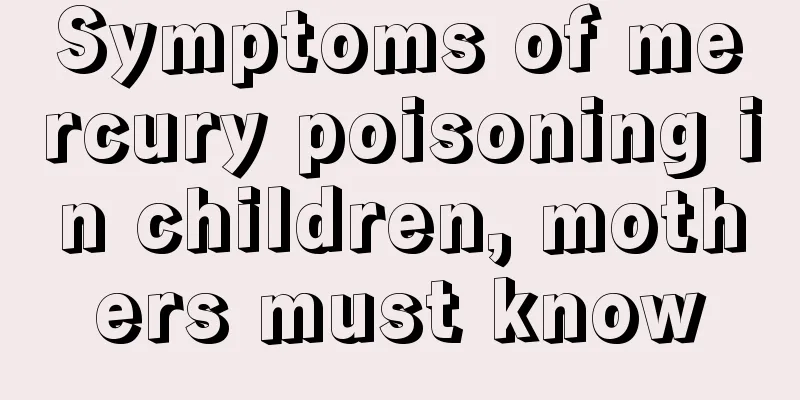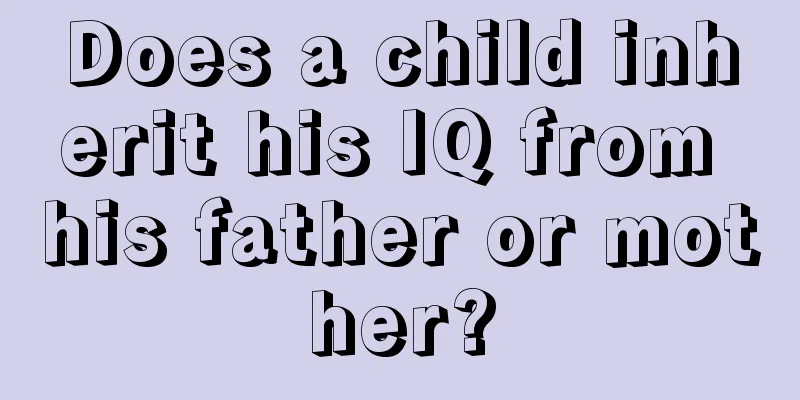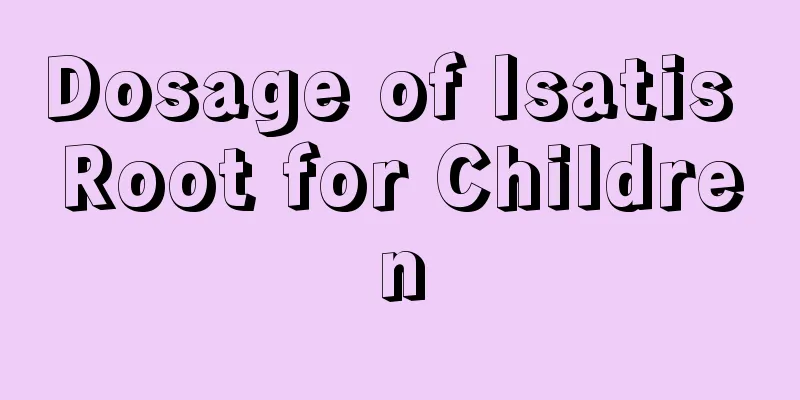Symptoms of mercury poisoning in children, mothers must know

|
Children are generally lively and active. They are curious about all new things and always want to put them in their mouths to feel them. Some children will even put the mercury thermometer used to measure their body temperature in their mouths and bite it when their parents are not paying attention. Some will even bite the mercury thermometer to pieces. This makes parents very scared because they are afraid that their children will accidentally swallow mercury and get poisoned. So what are the symptoms of mercury poisoning in children? In fact, the symptoms of mercury poisoning in children are divided into two types: acute poisoning and chronic poisoning. 1. Acute poisoning Symptoms of acute oral poisoning are: 1. Respiratory tract damage: Inhalation of large amounts of mercury vapor can cause corrosive damage to the respiratory tract, resulting in interstitial pneumonia and bronchiolitis. Children may experience coughing, respiratory distress, and fever. 2. Gastrointestinal symptoms: manifested as acute corrosive gastroenteritis. First, there is tightness and pain in the oropharynx, nausea and vomiting, and the vomitus contains gray mucus and bloody mucosal fragments. Abdominal pain, diarrhea, watery or bloody diarrhea, stools with mucus and blood, and containing large amounts of exfoliated intestinal mucosa, a feeling of tenesmus, similar to dysentery stools. Some patients even develop diffuse peritonitis due to gastrointestinal perforation. The child's tongue, sublingual gland and parotid gland are swollen, bloody mucus flows out of the mouth, there is a metallic taste in the mouth, the oral mucosa may be congested, edematous and necrotic, and the gums may be swollen. Bleeding and ulceration. 3. Nervous system: headache, dizziness, apathy, decreased vision, double vision, etc. In severe cases, convulsions, delirium, or even coma may occur. 4. Kidney disease: manifested as necrotizing nephropathy. Edema, oliguria or anuria, proteinuria, hematuria, tubular urine, azotemia, hyperkalemia, acidosis and other manifestations of acute renal failure often appear 4 to 10 days after poisoning, which are life-threatening. 5. Others: The child has a weak and irregular pulse, difficulty breathing, etc. Severe cases may cause severe acidosis, myocardial damage, heart failure, shock, coma, and convulsions. 2. Chronic mercury poisoning is rare in children. However, acrodynia and Minamata disease are syndromes of chronic poisoning in infants and young children, and Minamata disease is a central nervous system poisoning caused by methylmercury poisoning. 1. Limb pain: (1) Psychiatric and neurological symptoms: may include mental retardation, irritability, apathy, photophobia, sweating, hypertension, hypotonia, neuritis, stomatitis, drooling, gastritis and hair loss. (2) Skin symptoms: various rashes and secondary skin infections. The tips of the fingers and toes and the nose are initially pink, and the cheeks and nose tip are often scarlet. Later, the hands and feet become dark red with patchy ischemic and congested areas, peeling of the palms and soles, itchy skin and severe pain in the hands and feet, and even shedding of the nails and toenails, and necrosis of the extremities. (3) Other symptoms: tachycardia and myocardial damage are common. Tendon reflexes are normal or hyperreflexic at first, but disappear later. Fever may occur occasionally. Peripheral leukocytosis, proteinuria and glucosuria may be seen. 2. Minamata disease: A central nervous system poisoning disease caused by methylmercury poisoning caused by ingestion of fish and shellfish from mercury-contaminated river water. It was first discovered in Minamata Bay (Minamata Bay) in Japan, hence the name. (1) Main manifestations: sensory disturbances, pain, numbness of extremities, hearing and speech disorders, slurred speech, deafness, difficulty chewing and swallowing, visual impairment, movement disorders, weakness, ataxia, hemiplegia, tremor, incoordination of hands and feet, and even difficulty walking, photophobia, abnormal personality, mental retardation, mental retardation, confusion, convulsions, etc. In severe cases, there may be mental disorder, schizophrenia, convulsions, and finally death. (2) Infant Minamata disease: When pregnant women eat fish, shellfish and other aquatic organisms from waters contaminated by mercury, methylmercury can enter the baby's body through the placenta or breast milk, causing poisoning of the baby and central nervous system dysfunction. Soon after birth, the sick baby will develop varying degrees of paralysis and intellectual disability, severe mental retardation, coordination disorders, ataxia, difficulty walking, difficulty speaking, chewing and swallowing, poor growth and development, muscle atrophy, grand mal epilepsy, strabismus and laughter. The methylmercury content in their hair, blood and urine is all elevated. In mild cases, the disease manifests as slow growth, with high levels of methylmercury in the hair, blood, and urine. If the urine contains 0.02 mg/L of mercury, this can usually confirm the disease. The diagnosis can be confirmed based on the above medical history, clinical manifestations and laboratory tests, including significantly elevated urine mercury and blood mercury. Blood mercury is a reliable indicator for diagnosing acute mercury poisoning. If the blood mercury exceeds the normal value by more than 4 times, it indicates mercury poisoning. |
<<: Are pacifiers good for babies?
>>: What is the reason for children's sleepiness? It turns out to be these 4 points
Recommend
What causes nausea and retching in newborns?
If a newborn baby experiences nausea and retching...
What to do if your child knocks out a tooth
We all know that children are naturally lively an...
What causes a child to convulse suddenly?
Convulsion is a symptom. When a person suddenly h...
Are babies with late teething smart?
Some new parents are particularly anxious about t...
What causes swollen finger joints in children?
Possible symptoms of swollen finger joints in chi...
Can Shuanghuanglian oral liquid for children treat sore throat?
Shuanghuanglian oral liquid for children is mainl...
Five-month-old baby's growth and development standards
The birth of a new baby is something every family...
What to do if students have memory loss
Judging from today's education, all school ed...
What to do if teenagers have acne on their foreheads
Teenagers are in puberty, and it is easy for them...
What are the dangers of obesity to children?
Living conditions are getting better and better n...
The most effective way to treat jaundice
After a child is born, many vital signs need to b...
Is it okay to give a child a bath when he has a fever?
Many first-time mothers do not know what to do wi...
What should I do if my 10-month-old baby has a fever of 38 degrees?
A ten-month-old baby has a fever of 38 degrees, w...
How to deal with foreign matter in baby's eyes
Eyes are the windows to the soul. For every newbo...
What are the symptoms of slow intellectual development in children?
Intellectual retardation in children is a relativ...









